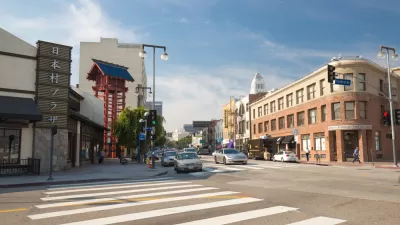The San Francisco Planning Commission took historic action earlier this month, voting to end the use of Level of Service in environmental review.
"The San Francisco Planning Commission voted 6-0 today to adopt a resolution to move forward with state-proposed guidelines that modernize the way city officials measure the transportation impacts of new development," according to a press release from the Planning Department of the City and County of San Francisco.
"The commission voted to remove automobile delay as a significant impact on the environment and replace it with a vehicle miles traveled threshold for all California Environmental Quality Act, or CEQA, environmental determinations. The resolution, put forward by San Francisco Planning, allows San Francisco to immediately implement changes to how it analyzes environmental impacts of development and transportation projects rather than wait for state adoption."
The press release includes more background on the differences between Level of Service (LOS) and Vehicle Miles Traveled (VMT). The press release also includes soundbites from San Francisco Planning Director John Rahaim discussing the benefits of VMT over LOS. Also noted is the ongoing drafting process for new CEQA regulations at the State Office of Planning and Research (OPR). Planetizen last reported on the CEQA reform process in January, when OPR released a draft of recommended changes to CEQA.
San Francisco joins Pasadena as California cities taking a leadership role on LOS while the state undertakes its process.
FULL STORY: San Francisco Planning Takes Lead in Modernizing Environmental Review for New Development Projects

Maui's Vacation Rental Debate Turns Ugly
Verbal attacks, misinformation campaigns and fistfights plague a high-stakes debate to convert thousands of vacation rentals into long-term housing.

Planetizen Federal Action Tracker
A weekly monitor of how Trump’s orders and actions are impacting planners and planning in America.

San Francisco Suspends Traffic Calming Amidst Record Deaths
Citing “a challenging fiscal landscape,” the city will cease the program on the heels of 42 traffic deaths, including 24 pedestrians.

Bend, Oregon Zoning Reforms Prioritize Small-Scale Housing
The city altered its zoning code to allow multi-family housing and eliminated parking mandates citywide.

Amtrak Cutting Jobs, Funding to High-Speed Rail
The agency plans to cut 10 percent of its workforce and has confirmed it will not fund new high-speed rail projects.

LA Denies Basic Services to Unhoused Residents
The city has repeatedly failed to respond to requests for trash pickup at encampment sites, and eliminated a program that provided mobile showers and toilets.
Urban Design for Planners 1: Software Tools
This six-course series explores essential urban design concepts using open source software and equips planners with the tools they need to participate fully in the urban design process.
Planning for Universal Design
Learn the tools for implementing Universal Design in planning regulations.
planning NEXT
Appalachian Highlands Housing Partners
Mpact (founded as Rail~Volution)
City of Camden Redevelopment Agency
City of Astoria
City of Portland
City of Laramie




























